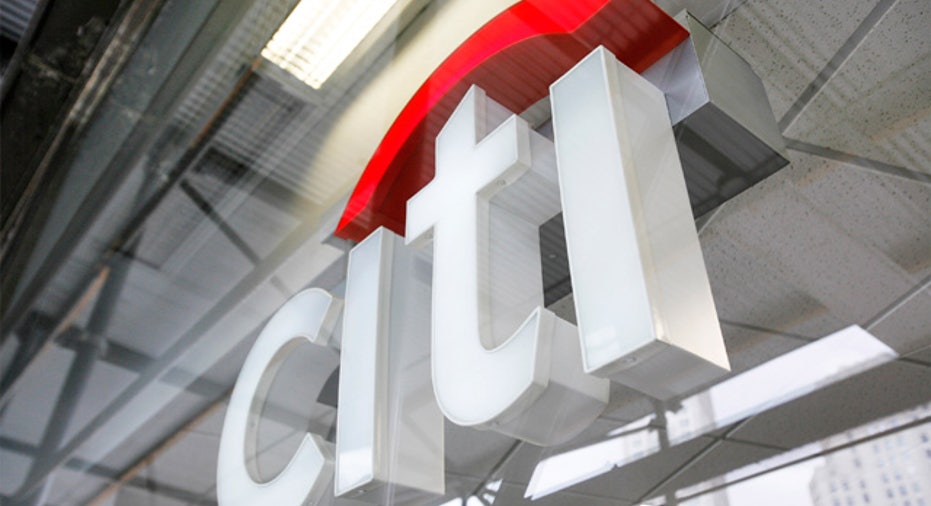Don't Panic Over Citi's Stress-Test Dud

By failing to receive blessing from the Federal Reserve to return cash to shareholders, Citigroup (NYSE:C) and its management team separated themselves in a negative fashion from most of their peers.
While the financial conglomerate suffered a post-stress test hangover on Wednesday, few believe the disappointing results alone will scuttle the banking giant’s lengthy comeback trail.
“They’ve come a long way from where they were in 2008. I don’t see this as necessarily a smack down of them. It’s a mixed bag of news,” said David Yermack, a finance professor at the NYU School of Business.
Late Tuesday the Fed said Citi’s capital action plan would leave it just below the crucial 5% level of Tier 1 common capital ratio, leaving the bank among just four of 19 that didn’t receive central-bank approval.
While Citi squabbles with those who say it “failed” the Fed-mandated stress tests, the disclosure can hardly be spun as good news.
That’s especially true because JPMorgan Chase (NYSE:JPM), Wells Fargo (NYSE:WFC) and a slew of rival banks indisputably passed the tests with flying colors and topped it off by unveiling plans to sharply hike their dividends.
“I don’t think investors are really giving much credence to their protests. You had a standardized test where everybody was looked at in a similar fashion,” Matt McCormick of Bahl & Gaynor Investment Counsel told FOX Business. “From an investment standpoint, why bet on somebody who has to prove a negative? Why not bet on somebody who is already exceeding?”
With that in mind, Wall Street bid Citigroup’s shares 3.5% lower to $35.18 on Wednesday, though that left them above their Monday close of $34.29. By contrast, the KBW banking ETF rallied more than 1% and the Dow flirted with new multiyear highs. The pullback ate into Citi's 2012 surge of nearly 40%.
Citing the stress-test results, analysts at JPMorgan downgraded Citi to “neutral” from “overweight” Wednesday morning.
“We think this denial also hurts management credibility,” JPMorgan wrote in the note, placing the blame squarely on the C-Suite, which is led by Vikram Pandit.
A credibility problem is never something Wall Street executives want to deal with as it can hamstring their interactions with shareholders, analysts and government overseers alike (see: Dick Fuld).
Citigroup’s rejected capital request also seems to hint at some of the high-risk attitudes that helped get banks like Citi into trouble before the crisis erupted.
“In our view, management was aggressive in its capital request given the still unstable operating environment. We view this negatively in terms of the firm's overall risk tolerance,” analysts at Standard & Poor’s wrote in a note.
But Yermack said rather than focusing on the stress tests, shareholders should be pleased with the job that Pandit has done since becoming CEO in 2007.
“At first, he didn’t look like he was going to last six months on the job and it didn’t look like the firm itself was going to survive,” said Yermack.
With the help of billions of dollars of taxpayer aid, Pandit has led Citi back from the brink of collapse and worked to restore investor confidence in the company. He has also spearheaded an enormous effort to shed Citi’s non-core assets and bolster its previously-tattered balance sheet.
“Perhaps his true skill is at negotiating generous bailouts, but for the shareholders of Citigroup that’s a very valuable skill to have,” said Yermack. “Pandit has really exceeded expectations and couldn’t possibly be viewed as being in any kind of trouble because of this report...I think he deserves a lot of credit for holding the fort.”
Likewise, Dick Bove, a veteran banking analyst at Rochdale Securities, urged investors not to read too much into the Fed rejection of Citi’s capital plans, noting the dire economic scenario the tests spell out.
“We’re not in a depression. We’re not in a situation remotely close to a depression. Therefore, to assume that if in a depression Citigroup didn’t get 5% after the dividend payment…affects their business today makes no sense whatsoever,” Bove told FOX Business.
For the most part, the markets seem to be seconding that opinion.
Citi’s 3% slide is hardly severe -- it actually matched a retreat for Goldman Sachs (NYSE:GS) -- and so far no other major analysts have downgraded their ratings on the stock.
And while Citi’s stock price slipped, so did the cost to insure its debt, a sign of increased confidence. According to Markit, the cost to insure $10 million of Citi bonds against default receded to $202,000 on Wednesday, down 3.8% decline from Tuesday and 12% from March 6.



















